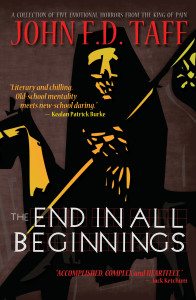
John F.D. Taff
Grey Matter Press
ISBN 978-1940658285
September 23, 2014; $16.99 PB, $3.99 eBook
Reviewed by Josh Black
The End in All Beginnings is billed by the publisher as “a disturbing trip through the ages in five novellas exploring the painful horrors of life, love and loss”. This is certainly an apt description, and readers who are into that aspect of the horror genre may well find this to be an essential read . Unique in their plots and subgenres, all of the stories here stand on their own and are excellent in their own right. Common themes and a prevailing heavy-hearted atmosphere, however, make the whole something much more than the sum of its parts.
“What Becomes God” begins the collection on a fittingly somber note, its evocation of the intangible realm of childhood colored darkly with the shadow of impending death. It relates the strange events of the final summer two young friends will ever share, and the desperation of their respective struggles to thwart the inevitable. The prose here seems at first to be on the florid side, but this quickly becomes a benefit rather than a hindrance. Taff’s words dance, moving together to paint a living, breathing world of beauty and despair. The direction the story eventually takes is unexpected, but isn’t a cheat – it gives closure in a poetic sort of way, bringing a corporeality to mirror the already heavy thoughts and feelings that have built up in the characters’ minds over the course of the story.
While “What Becomes God” cast a darkened light on the days of summer, the next offering, “Object Permanence”, is markedly autumnal. The story takes place in November, and centers around memory in both its clearest form and its gradual decay. Here Taff explores some intriguing questions: What if the fading of memory wasn’t so gradual? What if memory could be controlled, and what if someone, in controlling it, could effectively ensnare the people around them in a particular place and time? Without death, can we really consider ourselves alive? As the story develops and its well-plotted layers of mystery begin to unravel, the answers to these questions are progressively more heart-rending.
“Love in the Time of Zombies” continues tapping the heart-rending vein with its focus on one person’s love for another (relatively speaking), and the insurmountable distance that ensures that love remains unrequited. It’s a very (almost painfully) inward-focused story with a small cast of characters. Like all the best zombie fiction, it’s concerned more about the characters’ reactions to their changed lives than the zombies themselves – at least zombies the way we’ve typically come to view them. The ending, foreseeable as it may be, packs an emotional sucker-punch, and the journey there is equal parts melancholic and cringe-inducing.
“The Long, Long Breakdown” is another post-apocalyptic yarn, set in a near-future world in which the ice caps have melted and much of the world is underwater. This elemental story centers around a widower and his daughter living in a partly submerged high-rise, as satisfied with their lot as they can be, until they spot something across the waves that changes everything. The vivid setting is a character in itself with its storm-riled waters and the skeletal ruins reaching up from them. It’s a fine survival story, made greater by the themes it deals with – the persistence of loss and how it shapes us, and the powerful will of a parent guarding their child from harm.
“Visitation” maintains the theme of loss and opens it up beyond the terrestrial plane into the far reaches of space. This soft sci-fi tale takes the idea of a haunted house and reimagines it as a haunted planet – a place where people lucky enough to win an intergalactic lottery can confront their dead and find some closure. Naturally not all is as it seems. The story explores various beliefs regarding life after death, what it means to be human (and what it means to be a ghost), and various types of faith.
The author’s notes at the end of the book are illuminating, and the cover art and the black and white tarot card illustrations preceding each novella complement Taff’s subdued take on speculative fiction. Taken as a whole, The End in All Beginnings is a quiet tour de force, a near pitch-perfect offering of the kind of emotionally charged, idea-based horror that seems to have fallen out of favor lately. It’s a brilliant collection of dark fiction from a voice that has a lot to offer. Highly recommended.









Trackbacks/Pingbacks